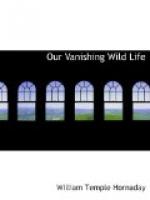I have described this method of trapping because of its future importance in the destruction of wild life in the Far East. The Chinaman in all his many millions is undergoing a remarkably swift and radical evolution both of character and dress. In many ways, if only from the viewpoint of the patient, thrifty store-keeper he is a most powerful factor in the East, and is becoming more so. In many cases he imitates the white nations by cutting off his queue and altering his dress. In some mysterious correlated way his diet seems simultaneously affected, and while for untold generations rice and fish has satisfied all his gastronomic desires, a new craving, that for meat, has come to him. The result is apparent in many parts of the East. The Chinaman is willing and able to pay for meat, and the native finds a new market for the creatures about him. Again and again when I wished a few specimens of some certain pheasant I had but to hail passing canoes and bid a few annas or “cash” or “ringits” higher than the prospective Chinese purchaser would give, and the pheasants were mine.
In the catalogues of the brokers’ sales of feathers we read of many thousands of the wonderful ocellated wing feathers of the argus pheasant, but no less horrible is the sight of a canoe crammed with the bedraggled bodies of these magnificent birds on their way to some Chinese hamlet where they will be sold for a pittance, the flesh eaten to the last tendon and the feathers given to the children and puppies to play with. The newly-aroused appetite of the Mongolian will soon be an important factor in the extermination of animals and birds, few species being exempt, for the Chinaman lives up to his reputation and is not squeamish as to the nature of his meat.
Before we leave the subject of Chinamen let us consider another recent factor in the destruction of wild life which is at present widely operative in China itself. This is the cold storage warehouse, of which six or eight enormous ones have gone up in different parts of the East. To speak in detail only of the one at Hankow, six hundred miles up the Yangtze, we found it to be the largest structure in the city. Surrounded by a high wall, with each entrance and exit guarded by armed Sikhs, it seemed like the feudal castle of some medieval baron. Why such secrecy is necessary I could not learn, as there are no laws against its business. But so carefully guarded is its premises that until a short time ago even the British consul-general of Hankow had not been allowed to enter. He, however, at last refused to sign the papers for any more outgoing shipments until he should be allowed to see what was going on within the warehouse. I hoped to be able to look over some of the frozen pheasants for interesting scientific material, but of course was not allowed to do so.




